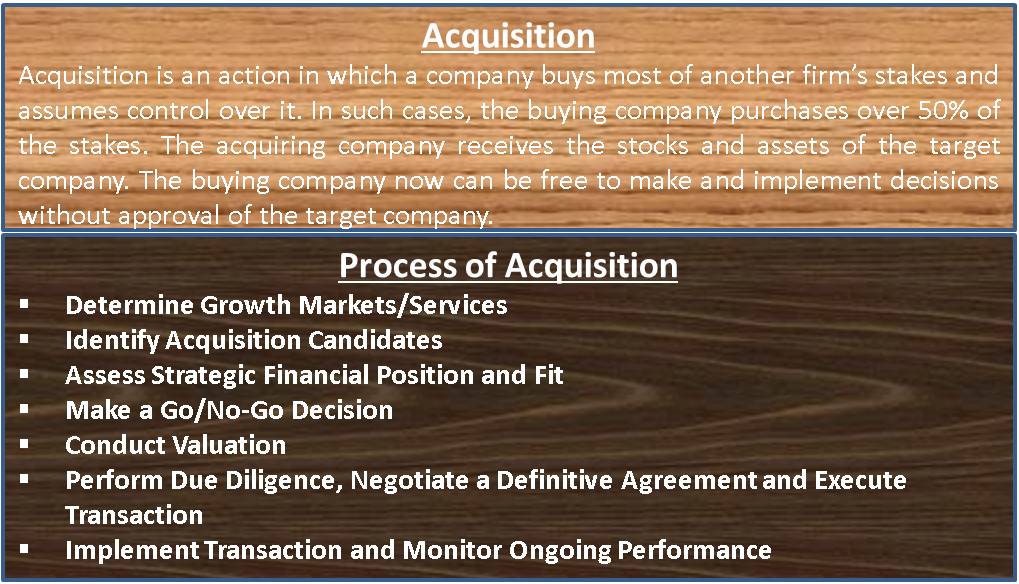Definition Of Acquisition
The acquisition is an action in which a company buys most of another firm’s stakes and assumes control over it. The buying company purchases over 50% of the stakes in such cases. The acquiring company receives the stocks and assets of the target company. The buying company now can be free to make and implement decisions without the approval of the target company. The method of payment for acquisitions can be either in cash or in the acquiring company’s stocks.
After gaining an insight into acquisition, let’s look at the process for the same.
Process Of Acquisition
The following is the process of acquisition:
Determine Growth Markets/Services
The organization starts the process by evaluating and identifying growth opportunities in service lines or markets served. To determine possible growth markets, the company accumulates and analyzes extensive data. Data accumulation is done in various fields such as client origin, employers, competitors, field staff, employees, service mix, competitive cost, and consumer opinions.
Identify Acquisition Candidates
The next step in the merger and acquisition process is the identification of potential acquisition candidates. The candidates should meet strategic financial growth objectives in identified markets. The acquiring company identifies potential acquisition candidates by doing research, with management experience, or by taking the help of consultants.

Later the company systematically categorizes the candidates as “likely suspects” and “outside the box” prospects.
Assess Strategic Financial Position and Fit
At this stage, acquiring a company forms a detailed assessment of the credit and financial position of the target company. The valuation focuses on cost, revenue, volume, and balance sheet considerations. The company evaluates the likely benefits and risks of acquiring the target. The last comparison is made between this target company and the other possible options.
Make a Go/No-Go Decision
The management of the company makes a final decision on whether the acquisition should be commenced or not. The data accumulated in the previous step on the benefits and drawbacks of the acquisition assist in making this decision.
Conduct Valuation
The offer is prepared in the fifth step of acquiring the target company. The offer is framed on the basis of the value of the target, identifying and evaluating the possible ways of structuring the acquisition transaction, and lastly, selecting the structure that would work in favor of the acquiring company and assist in achieving the objectives. The three key methods to prepare valuations are comparable publicly-traded company analysis, comparable transaction analysis, and discounted cash flow analysis. The management of the acquiring company then decides on the suitable valuation method.
Perform Due Diligence, Negotiate a Definitive Agreement and Execute Transaction
Once the offer is accepted by both the companies, the acquiring company prepares a due diligence review of the target company on the basis of the financial, operational, and legal position. Both the companies then negotiate and prepare a conclusive agreement. On obtaining the required regulatory approvals, the transaction is closed. The acquiring company monitors the executed transaction and makes sure that the goals and objectives established are correctly met.
Implement Transaction and Monitor Ongoing Performance
A successful acquisition involves uniting two organizations in a beneficial manner to achieve profit maximization while minimizing distraction to existing operations. The organizations will have to be prepared and seek solutions to any future problem arising in the implementation of the acquisition. Now that we know the entire acquisition process, below are some examples to further clarify the concept.
Also Read: Characteristics of M&A Transactions
Examples Of Acquisitions
Facebook acquired Whatsapp
The acquisition of Whatsapp by Facebook took place in early 2014. However, just like Instagram, Facebook kept Whatsapp as a separate entity. The deal value, including cash and stock, was $19 billion. Facebook paid an amount of $4.6 billion in cash and issued the remaining 178 million shares. Facebook gave the benefit of 46 million restricted stock units to Whatsapp employees, which hold for 7.9% of Facebook’s shares.
Verizon acquired Yahoo
Verizon Communications acquired Yahoo Inc. for an amount of $4.48 billion. Yahoo was a tech pioneer with a valuation of more than $100 billion; however, the completion of this deal marks the end of the stand-alone internet company. Verizon plans to combine Yahoo with AOL, which it bought a couple of years ago. Tim Armstrong, the AOL CEO, plans to run a new venture called OATH.
Conclusion
Acquisitions are a part of the growth strategy that companies implement, as is it more viable to acquire an existing company than to keep expanding the parent company. However, the valuations and preparation of the offer require knowledge and research. If done correctly, acquisitions might prove to be the best method for expansion.
Also, refer to Mergers Vs. Acquisitions.

